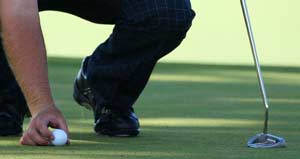The Hacker: How can I relax if everyone else gets a higher handicap?

It's not often that I question the handicaps of other golfers but I did suffer a mild tantrum in January when my regular playing companion John had his raised from 20 to 21.
Perhaps it was the way I found out. As a 28-handicapper I used to get eight shots from him in our weekly game at Royal Porthcawl.
We were playing the third, which is stroke index eight, and I sank what I thought was a winning putt when he interrupted my celebrations – nothing more than a discreet mental fist-pumping, I assure you – by saying: "I'm afraid that's a half. You don't get a shot there any more."
It turns out that in the annual handicap review held at The Glamorganshire, where we both get our handicaps from, he had been given an extra shot.
The match captain who decides such matters is a regular at our Thursday night beer fest/forumat The Glamorganshire and I harangued him on the subject at the next opportunity. He was a little non-plussed.
Obviously, with hundreds of handicaps to review at the end of the year, it is not easy to bring every one to mind but usually the handicaps of the consistent under-performers are the onesthat get raised.
Since John hadn't played in many medals and is by no means an under-performer, I couldn't understand the generosity, especially as he beat me eight and six in that game.
The match captain kindly suggested that one shot wouldn't account for me getting stuffed by that margin. That's not the point, I said. I need all the help I can get.
A 28-handicapper faces more problems than just being an object of derision. It is as high as you can go and you are stuck there while many other players are gradually creeping upwards, thereby reducing the number of shots you get from them.
Men in my age group who used to be off single figures are now edging up into the high teens. I'm not criticising the handicapping system, which works very well, but if it wasn't for the inspired decision to give the full difference in competitions, high handicappers would have an even harder task.
Now that ladies in golf clubs have equality – and it is lovely to see them enjoying it – I did hope that we could have equal handicaps, too. They can go up to 36, but I get mocked whenever I suggest it.
There is a more obvious way out of the dilemma, of course, and that is to improve. I am embarked on that very mission.
John, the match captain and myself haven't fallen out over all this. Indeed, they had a chat and John suggested that he reverted to his former handicap of 20. I feel a bit guilty now but he still beat me three and two last Wednesday.
He is, however, playing very well and, dare I say it, I'm giving him a much closer game. The previous week, in a howling gale, I halved the match with him and, but for a rush of blood this time when I looked like winning the 16th, I might have prevented the loss of another three quid.
I am taking advice on a new, more relaxed swing and it seems to be working. My game is still erratic but I am hitting a higher percentage of straight and true shots.
Relaxation in the presence of a golf ball doesn't come easy to a hardened hacker like myself. The late doyen of golf writers, Peter Dobereiner, once described my swing as like "a policeman trying to break down a door".
Although I do my best to relax, the temptation to take a mighty heave with the club seems always to be simmering under the surface.
Once tension creeps into the act, your grip tightens and all manner of errors creep in. Putting soft hands on the club and letting it all hang loose is the answer. But it is difficult to introduce such calm thoughts into a frame conditioned to hit hell out of the ball.
Simon Iliffe's tip of the week
No 91: Chipping to a raised green
When you need to play to a green which is above your level of stance, there are a few factors to take into consideration.
The ball will be landing sooner than normal, so you need to be more aggressive and play the shot a little firmer than expected.
If your normal shot is to allow for a little roll, try to imagine flying the ball all the way to the hole.
Remember, however, that the back-spin you generate will be less influential when playing to a raised green. This means the ball will roll a little further.
Try to play with as much loft as possible. A lob wedge will reduce the amount of run on the ball.
Finally, make sure to trust your swing. Don't scoop and try to lift the ball. Strike down as normal on the back of the ball and let the loft of the club do the work.
Simon Iliffe is head professional at Bramley Golf Club, Surrey. www.theshortgame.co.uk
Subscribe to Independent Premium to bookmark this article
Want to bookmark your favourite articles and stories to read or reference later? Start your Independent Premium subscription today.

Join our commenting forum
Join thought-provoking conversations, follow other Independent readers and see their replies